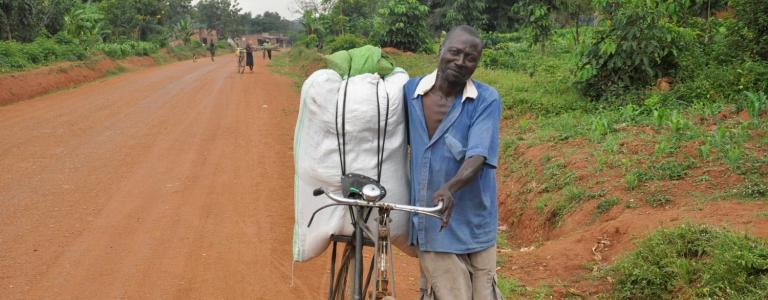Private Sector Investment in a Changing Climate: Resilient rice value chain development in Uganda
The Private Sector Investment in a Changing Climate (PSI–Climate) initiative aims to explore how domestic private sector investments can support climate risk management along agricultural value chains.
The increased risk and uncertainty that result from the impacts of climate change creates challenges for all actors along agricultural value chains. The domestic private sector plays an important role in driving and shaping the development of agricultural value chains. Specifically, the private sector has the potential to direct their investments in ways that enable climate risk management by different value chain actors, simultaneously reducing risks to their own bottom line.
This initiative specifically focuses on rice value chains in Uganda, where rice is one of the priority crops for the government's efforts to achieve food security and improve household income. The initiative targets two main sets of actors: private sector actors (mostly domestic seed companies and commercial banks) in Uganda who are investing at one or several points along selected rice value chains, and public sector actors (i.e., relevant government ministries, departments). For private sector actors, PSI–Climate seeks to demonstrate how climate risk management can be supported along agricultural value chains and the consequent benefits to their own business goals and objectives. For public sector actors, it aims to identify a set of policy options that encourage climate risk management by small and medium-sized enterprises, domestic commercial banks and other actors along agricultural value chains.
The research focuses on two case studies. The first is on domestic private investments in new rice seeds in Northern Uganda in partnership with a domestic seed company, Equator Seeds. The second looks at investments in financial products with a commercial bank, the Centenary Bank, in Eastern Uganda. Data collection in both cases is based on focus group discussions, interviews and dialogue processes with key actors along the selected rice value chains, as well as engagement with relevant experts. IISD is implementing this project in collaboration with the Ministry of Finance, Planning and Economic Development and the Economic Policy Research Center (EPRC).
This project builds on IISD's previous work on building climate-resilient agricultural value chains.
Related Work
Climate Risk Management for Local Agricultural Cooperatives in Rwanda
Building the Climate Resilience of Agriculture Value Chains in Uganda through Stakeholder Dialogues
This project aims to address the negative impacts of climate hazards such as droughts, floods, and changing rainfall patterns on coffee value chains in Uganda.
Project team

Julie Dekens
Principal Researcher

Angie Dazé
Director, Gender Equality and Social Inclusion for Resilience

Anne Hammill
Associate Vice-President, Resilience

Matthew McCandless
Interim VP Operations and Business Transformation

Jo-Ellen Parry
Deputy Director, Resilience

Dimple Roy
Director, Water Management
Latest
You might also be interested in
Building the Climate Resilience of Agriculture Value Chains in Uganda through Stakeholder Dialogues
This project aims to address the negative impacts of climate hazards such as droughts, floods, and changing rainfall patterns on coffee value chains in Uganda.
Task Force for a Resilient Recovery
With ideas from Canada and around the world, our Task Force aims for a resilient recovery—one that delivers good jobs, is positive for the environment, and addresses inequality.
AQUA-Pearl
A new project will help communities in Fiji build their resilience to climate change through nature-based approaches to oyster aquaculture.
Climate Adaptation and Protected Areas Initiative
A new initiative will use nature-based solutions to support local communities in adapting to climate change while safeguarding critical ecosystems in and around protected areas.
